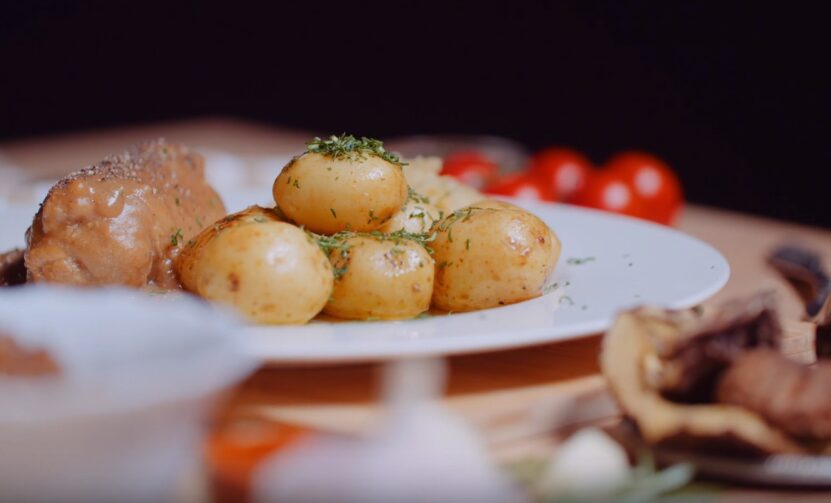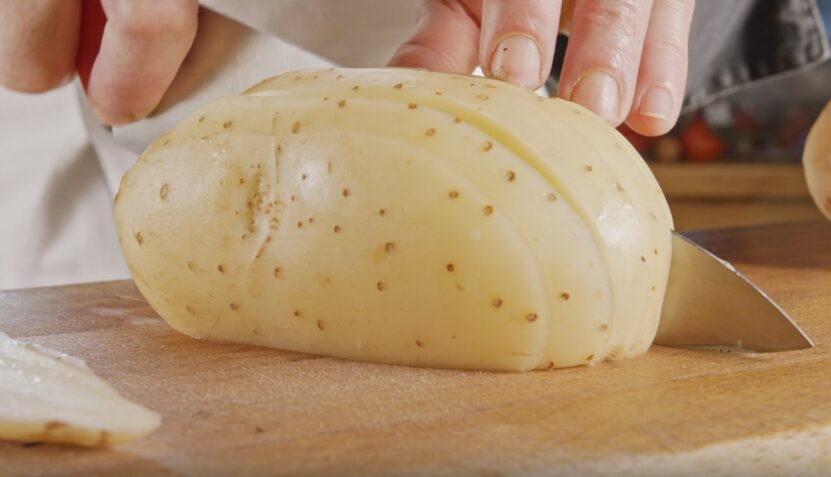While potatoes in their cooked form are a nutritious and delicious addition to our diets, it’s important to understand the consequences of eating them uncooked.
The following sections will provide more details about the risks involved and the best ways to prepare potatoes to ensure they are both safe and enjoyable to eat.
Why is it Dangerous?

Eating raw potatoes has been a subject of concern among nutritionists and food safety experts. The potential risks associated with this practice arise from various factors intrinsic to the potato itself, especially when it is uncooked.
Health Risks
The primary concern with consuming raw potatoes revolves around the presence of certain compounds that can be harmful to human health.
- Antinutrients: Potatoes contain antinutrients like lectins and protease inhibitors. These substances can interfere with the body’s ability to absorb essential nutrients, particularly proteins and certain minerals.
- Glycoalkaloids: Glycoalkaloids, such as solanine and chaconine, are naturally occurring compounds in potatoes that can be toxic when consumed in high quantities. The concentration of these glycoalkaloids tends to be higher in green potatoes, those that have been exposed to light, or potatoes that are sprouting. Symptoms of glycoalkaloid poisoning can range from gastrointestinal distress to more severe neurological disorders. In extreme cases, high levels of glycoalkaloids can be fatal.
- Digestive Issues: Raw potatoes are rich in resistant starch, which is not easily broken down by the digestive system. While resistant starch can have health benefits, including improved insulin sensitivity and gut health, excessive consumption of raw potatoes can lead to digestive discomfort, including bloating, gas, and cramps.
- Bacterial Contamination: Potatoes that are consumed raw may also carry harmful bacteria, including E. coli and Salmonella. These pathogens can cause foodborne illnesses, with symptoms ranging from mild gastrointestinal distress to more severe dehydration and even hospitalization.
- Pesticides and Chemicals: If not properly washed, raw potatoes can retain traces of pesticides and other chemicals used during cultivation, which can pose additional health risks.
As you can see, it is very important to learn more about various safety guidelines related to food and dishes. While it is quite simple when it comes to potatoes, and you can easily recognize when it is raw, things may not be that simple for other types of food, like fish, meat, seafood, and more. For example, for how long you can keep shrimps in the fridge.
How to Know When It is Well-Prepared?

To mitigate these risks, it is crucial to know how to properly prepare and cook potatoes.
- Cooking Temperature: Potatoes should be cooked to an internal temperature of 210°F. This temperature ensures that the harmful compounds are broken down, making the potatoes safe for consumption.
- Texture and Consistency: A well-cooked potato will have a soft and tender texture. It should offer no resistance when pierced with a fork or knife. Potatoes that feel firm or have a crunchy texture are likely undercooked and may still contain harmful compounds.
- Color and Appearance: Potatoes should be cooked until they change color to a golden brown (if roasted or fried) or a lighter, more translucent shade (if boiled or steamed). Avoid eating potatoes that exhibit green coloring or are sprouting, as these are signs of high glycoalkaloid content.
- Proper Cleaning and Peeling: Thoroughly washing and peeling potatoes can reduce the risk of ingesting residual pesticides and bacteria. While peeling may reduce the nutritional value slightly, it significantly lowers the risk of consuming harmful substances.
- Avoiding Green or Sprouted Potatoes: Green discoloration and sprouting are indicators of increased solanine levels. These potatoes should not be consumed, even after cooking, as the level of glycoalkaloids may remain high.
| Nutrient | Amount | Daily Value |
|---|---|---|
| Calories | 77 kcal | N/A |
| Water | 79.3 g | N/A |
| Protein | 2.0 g | 4% |
| Carbohydrates | 17.5 g | 6% |
| Fiber | 2.2 g | 8% |
| Sugars | 0.8 g | N/A |
| Fat | 0.1 g | 0% |
| Vitamin C | 19.7 mg | 22% |
| Potassium | 421 mg | 9% |
Cooking Tips
Preparing potatoes in a manner that maximizes their nutritional benefits while ensuring safety is an art in itself. The key lies in understanding the various cooking methods that not only enhance the flavor of this versatile vegetable but also neutralize any potential health risks associated with its raw form.
Best Ways To Prepare Potatoes?
- Boiling: Boiling is a straightforward and effective method to cook potatoes. Begin by peeling and cutting the potatoes into uniform pieces for even cooking. Immerse them in cold, salted water, then bring to a boil. Reduce the heat and simmer until they are tender, which typically takes about 15-20 minutes depending on the size of the pieces.
- Baking: Baking potatoes whole in their skins is a nutritious way to enjoy them. Preheat your oven to 425°F, pierce the potato skins with a fork to allow steam to escape, and bake for about 45-60 minutes. The skins become deliciously crispy, while the insides remain fluffy and soft.
- Roasting: To create a flavorful and crispy exterior, roasting is ideal. Cut potatoes into even chunks, toss with olive oil, herbs, salt, and pepper, and spread them on a baking sheet. Roast in a preheated oven at 425°F for about 25-35 minutes, turning them halfway through the cooking time.
- Microwaving: For a quick and convenient method, microwaving works well, especially for smaller quantities. Pierce the potatoes several times with a fork, place on a microwave-safe plate, and cook on high for about 5-7 minutes per potato, turning halfway through.
- Frying: While not the healthiest method, frying potatoes can be done in a way that minimizes oil absorption. Use a light coating of oil and cook them in a non-stick pan over medium-high heat, turning frequently until golden and crispy.
Best Recipes
Potatoes are incredibly versatile and can be the star of many delicious recipes.
Fluffy Mashed Potatoes
| Ingredients | Instructions |
|---|---|
|
|
Classic Potato Salad
| Ingredients | Instructions |
|---|---|
|
|
Crispy Roasted Potatoes
| Ingredients | Instructions |
|---|---|
|
|
FAQs
What vegetables can you not eat raw?
Some vegetables that should not be eaten raw are kidney beans, lima beans, rhubarb leaves, potatoes, and cassava. These vegetables contain toxins or antinutrients that can cause digestive problems or poisoning if consumed raw.
Why do I crave raw potatoes?
You may crave raw potatoes because of a deficiency in certain nutrients like potassium or vitamin C, or due to dehydration. Raw potatoes are a food that contains vitamins C and B, fiber, and other nutrients necessary for the growth, development, and repair of body tissues.
Can you eat green potatoes?
Green potatoes are not safe to eat because they contain solanine, a toxic compound that can cause nausea, vomiting, diarrhea, headache, and other symptoms. Solanine is produced when potatoes are exposed to light, and it is usually concentrated in the skin and sprouts.
How do you remove solanine from potatoes?
There is no effective way to remove solanine from potatoes, as cooking or peeling them does not significantly reduce the solanine levels. The best way to prevent solanine poisoning is to store potatoes in a cool, dark place and avoid eating potatoes that are green, sprouted, or damaged.
Last Words
While nibbling on a raw potato might not lead to immediate catastrophe, it’s best to exercise caution. Raw potatoes contain compounds like glycoalkaloids, lectins, and solanine, which can cause digestive discomfort and, in extreme cases, pose serious health risks. To ensure your safety, it’s advisable to enjoy potatoes in their cooked form, and always remember to wash and peel them properly.
